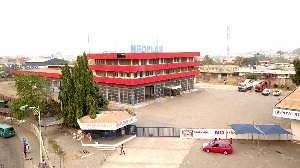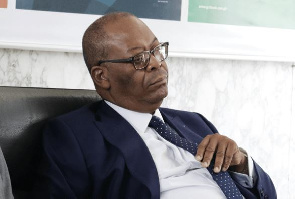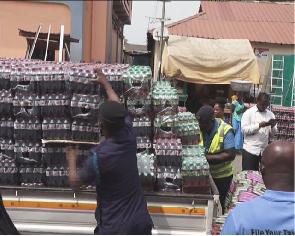Neoplan Ghana Ltd shuts down January 31


Neoplan Ghana Limited, one of the country’s surviving coach manufacturing businesses in the 1970s, has announced a total shutdown on Friday, January 31, 2020 because it is no longer viable.
A memo to all staff of the company in Accra and Kumasi announcing the closure of the company, which was established on December 12, 1974, cites the lack of contracts and recurring monthly losses as reasons for the shutdown.
The company said the last time it was given a government contract was in 2002, which ended in 2010 and saw the production of 450 DAF/VDL buses for the Metro Mass Transit Ltd.
Dated January 15, 2020, and titled “Closure of Neoplan (Ghana) Limited”, the memo signed by the Managing Director of the company, Mr Georges Nassar, a copy of which is in the custody of the Daily Graphic, states: “Management regretfully informs you that Neoplan (Ghana) Limited will be closing down its branches on 31st January 2020.”
“This is due to lack of contracts and recurring monthly losses incurred. As a result, all employment contracts with the company will be terminated as of the said date until further notice,” the memo added.
Mr Nassar confirmed the imminent shutdown in an interview with the Daily Graphic last Saturday.
He said the decision had been informed by the inability of the minority shareholder, the Fadoul Group, to continue funding the company all by itself, while the government which was the majority shareholder contributed nothing to its running.
“In the past six, seven years, we have been running the company ourselves without any contribution from the government. In 2016, we asked the government to buy additional shares from them so that we can finance the company ourselves.
“In 2016, we paid them for the shares. They didn’t give us the shares and they kept the money with them,” an exasperated Mr Nassar said, adding that the money paid for the shares was $173,000.
He explained that the money was paid to the Divestiture Implementation Committee (DIC) but the cheques were never released, yet the money was never returned.
In addition, he said since 2016 the minority shareholders had invested about GH¢10 million in the company, while about GH¢260,000 had been lost every month in revenue during the period.
Wits’ end
Mr Nassar said the company had tried everything, including asking the government to stop importing coaches and allow them to produce robust and quality buses locally, since it had the capacity, as well as reduce import duties on parts they needed but all had been to no avail.
“Yet, we continued financing the company until 2019 and then the chairman of the minority shareholders said we should stop financing until the majority shareholder starts financing because they haven’t invested anything for the last five years till today,” he stated.
Loss of jobs
The Neoplan Ghana managing director indicated that when the company closed down on Friday, about 100 workers, who were the remaining staff after pruning over the years, would lose their jobs.
At the peak of production, the permanent workers of the company were about 800, Mr Nassar added.
He, however, said although the workers were owed a backlog of salaries, that situation would have to be handled by the government as the majority shareholder and also because they owed the company, and not the minority shareholder.
He, however, declined to mention how much salaries the workers were owed.
Background
During the almost 46 years of its existence, Neoplan (Ghana) Limited has built over 4,000 buses for the government, which has 55 per cent majority stake, to support the transport sector.
In its heyday, the company gave employment to hundreds of Ghanaians and also offered one of the best options for road transport passenger vehicles.
It is in view of its popularity with Ghanaian commuters that two major bus terminals in Accra and Kumasi, as well as the localities where the company operates from within the two cities, have for a long time been called Neoplan.
The company can employ over 1,000 workers when in full production and running the shift system of production.
Window of hope
In spite of its present predicament, Neoplan’s management is nursing a faint hope that a request made in December last year for a credit facility from the One District, One Factory (1D1F) Secretariat, would eventually yield results and prevent the company from becoming defunct.
“Please, rest assured that you will be called back as soon as the government of Ghana (Majority Shareholder) supports the company financially or gives us a contract.
“Thank you for your hard work and dedication and we hope that the government comes in to help us as soon as possible,” the memo, which was copied to the Industrial and Commercial Workers Union (ICU) and the Professional and Managerial Staff Union (PMSU), said to the workers of the company.
Beginning of woes
The company began the journey to its current state nine years ago when it stopped active production and started depending on minor repairs and maintenance of accident buses.
In the application letter dated December 8, 2019 making a case for the 1D1F credit facility, which checks show was received by the Ministry of Trade and Industry on December 18, 2020, the company stated that the revenue from the repairs and maintenance were woefully inadequate to meet its operational cost, hence the dire straits it had found itself in.
Coupled with that, the Neoplan company said over the years it had faced keen foreign competition from Korea, Malaysia, China, Sweden, Germany, Italy, France, India and Brazil among other countries, which brought buses such as KIA, Daewoo, Hyundai, Yutong, Scania, Marco Polo, Tata, Ashok-Leyland, Mercedes Benz and Volvo into the country, which had gradually pushed them out of business.
“This situation is seriously affecting the operation of the company and it is against this background that management is soliciting a credit facility from the 1D1F to support its operations,” the letter stated further.
Apart from a feasibility project plan, which the company is hoping would turn its fortunes around should it receive the requested support, it states that it fulfills the 15 per cent capital expenditure requirement for a 1D1F factory set-up.
Furthermore, with the company’s experience in bus production, it said it could guarantee the consistent supply of raw materials such as chassis and bus body kits from its renowned suppliers overseas at competitive prices.
Source: Graphic.com.gh





